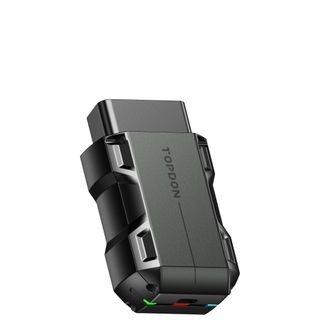For car enthusiasts and everyday drivers alike, understanding your vehicle’s health is paramount. Modern cars are complex machines, but thankfully, onboard diagnostic (OBD) systems provide a window into their inner workings. An OBD-II scanner is the key to unlocking this information, connecting to your car’s computer to reveal valuable insights about its performance and potential issues. Whether you’re facing a mysterious check engine light or simply want to stay proactive with maintenance, the Best Rated Obd Ii Scanner can empower you to diagnose problems and save money on costly professional repairs.
However, the market is flooded with options, and choosing the right OBD-II scanner can be overwhelming. We’ve rigorously tested a wide array of scanners, from basic models to professional-grade tools, to bring you a curated list of the top performers. Keep reading to discover our recommendations for the best rated OBD II scanners available today, along with a comprehensive guide to understanding how these devices work and what those cryptic error codes really mean.
Our top picks include versatile devices like the Topdon TopScan, a wireless marvel packed with features for in-depth diagnostics, and budget-friendly champions like the Launch CR529, offering incredible value without sacrificing essential functionality. For those seeking professional-level capabilities, the Topdon Phoenix Lite 2 delivers an advanced diagnostic experience, albeit at a premium price.
Here are our selections for the best rated OBD-II scanners you can purchase right now, based on hands-on testing and expert evaluation.
[](best mobile obd2 scanner)
Top Picks: Best Rated OBD-II Scanners at a Glance
To help you quickly find the ideal scanner, here’s a brief overview of our best rated OBD-II scanner selections. Scroll down for detailed reviews of each product.
- Topdon TopScan: Best Mobile OBD-II Scanner
- Launch CR529: Best Cheap OBD-II Scanner
- Topdon Phoenix Lite 2: Best Professional-Level OBD-II Scanner
- Ancel BD310: Best Dual-Purpose OBD-II Scanner
- Carly OBD-II Scanner: Best Scanner with a Companion App
[](best budget obd2 scanner)
[](best professional obd2 scanner)
[](best dual purpose obd2 scanner)
[](best obd2 scanner app)
Deep Dive: Exploring the Best Rated OBD-II Scanners
To provide comprehensive insights, we delve deeper into each of our best rated OBD-II scanner choices, outlining their key features, pros, and cons based on our extensive testing.
1. Topdon TopScan: Best Mobile OBD-II Scanner
(Image credit: Topdon)
The Topdon TopScan redefines the mobile OBD-II scanner experience. This Bluetooth-enabled device is incredibly easy to set up and packed with features that rival professional-grade scanners. Beyond basic fault code reading and I/M readiness tests, the TopScan offers advanced capabilities such as performance and efficiency checks, horsepower and torque estimations, and even predictive diagnostics to anticipate potential issues.
Key Features and Specifications:
- Display/Size: None (App-based)
- Bluetooth/Handheld: Yes/No
- I/M Readiness Test: Yes
- Live Data Display: Yes
- Keys: None (App-based)
- Warranty: 2 years
- Size: 3.2 x 2.0 x 1.1 inches
- Weight: 2.6 ounces
Pros:
- Extensive vehicle diagnostic coverage.
- Displays real-time live data.
- Unique performance indicators.
- Covers essential maintenance items.
Cons:
- Larger and heavier transmitter compared to some competitors.
- Advanced features may require a subscription after the first year.
The Topdon TopScan’s compact design belies its powerful capabilities. It’s an exceptional tool for both DIY enthusiasts and seasoned mechanics seeking a portable and feature-rich best rated OBD II scanner.
2. Launch CR529: Best Cheap OBD-II Scanner
(Image credit: Future)
For budget-conscious users, the Launch CR529 stands out as the best rated OBD-II scanner in its price range. Priced under $50, this handheld scanner delivers a surprising array of diagnostic features, including live data, instant inspection reports, and lifetime updates, ensuring long-term value. While it may lack some advanced functionalities found in higher-end models, the CR529 provides essential OBD-II diagnostics for everyday car owners.
Key Features and Specifications:
- Display/Size: Color/ 2.8-inches
- Bluetooth/Handheld: No/Yes
- I/M Readiness Test: Yes
- Live Data Display: Yes
- Keys: 8
- Warranty: 1 year
- Size: 6.5 x 3.8 x 1.2 inches
- Weight: 11 ounces
Pros:
- Highly affordable.
- Lifetime software updates.
- Easy pre-inspection report generation.
Cons:
- Does not support manufacturer-specific specialty codes.
- Feels somewhat heavy.
- Shorter 1-year warranty.
The Launch CR529 offers exceptional value, providing essential diagnostic features at an unbeatable price. It’s an ideal best rated OBD II scanner for users seeking a reliable and affordable tool for basic car maintenance and troubleshooting.
3. Topdon Phoenix Lite 2: Best Professional-Level OBD-II Scanner
[](best rugged obd2 scanner)
(Image credit: Future)
The Topdon Phoenix Lite 2 bridges the gap between amateur and professional diagnostics, offering a near-professional experience in a user-friendly package. This robust handheld scanner features a large 8-inch touchscreen, wireless Bluetooth connectivity, and a comprehensive suite of diagnostic tests and live data capabilities. While it comes at a higher price point, the Phoenix Lite 2 provides advanced functionalities and durability for serious DIYers and professional mechanics seeking a best rated OBD II scanner.
Key Features and Specifications:
- Display/Size: Color/8-inch
- Bluetooth/Handheld: Yes/Yes
- I/M Readiness Test: Yes
- Live Data Display: Yes
- Keys: Touchscreen
- Warranty: 2 years
- Size: 10.2 x 7.2 x 1.7 inches
- Weight: 2.6 pounds
Pros:
- Near-professional OBD scanner capabilities.
- Hybrid handheld with Wi-Fi and Bluetooth.
- Large 8-inch touchscreen display.
- Excellent diagnostic tests and live data features.
- Includes adapters and a hard case for storage.
Cons:
- Bulky and heavy design.
- Higher price tag.
- Subscription required for updates after two years.
The Topdon Phoenix Lite 2 is a powerful and versatile best rated OBD II scanner that delivers near-professional diagnostic capabilities. Its robust design and comprehensive features make it a worthwhile investment for users demanding advanced functionality and durability.
4. Ancel BD310: Best Dual-Purpose OBD-II Scanner
(Image credit: Tom’s Guide)
The Ancel BD310 offers a unique dual-purpose functionality, serving as both a standard handheld OBD-II scanner and a supplementary vehicle display. When connected to a smartphone via Bluetooth, the BD310 can project engine data directly onto your dashboard. Its compact and lightweight design makes it highly portable, while still providing essential OBD-II diagnostic features, making it a versatile best rated OBD II scanner option.
Key Features and Specifications:
- Display/Size: Color/2 inches
- Bluetooth/Handheld: Yes/Yes
- I/M Readiness Test: Yes
- Live Data Display: Yes
- Keys: 4
- Warranty: 3 years
- Size: 5.1 x 2.4 x 0.6 inches
- Weight: 5.4 ounces
Pros:
- Lightweight and compact.
- Functions as both a scanner and secondary car display.
- Offers handheld and Bluetooth scanning options.
Cons:
- Minimalist interface.
- Small 2-inch screen.
The Ancel BD310’s dual functionality and compact design make it a convenient and practical best rated OBD II scanner for users who value portability and real-time vehicle data display.
5. Carly OBD-II Scanner: Best Scanner with a Companion App
(Image credit: Carly)
The Carly OBD-II Scanner distinguishes itself with its exceptional companion app, providing a user-friendly and feature-rich mobile diagnostic experience. While the scanner’s capabilities are car-dependent, particularly optimized for brands like VW, BMW, and Ford, the Carly app offers advanced customization, professional-level tests, and repair assistance. For users within its compatible vehicle ecosystem, the Carly scanner delivers a premium app-driven diagnostic solution and is considered a best rated OBD II scanner for its companion app experience.
Key Features and Specifications:
- Display/Size: None (App-based)
- Bluetooth/Handheld: Yes/No
- I/M Readiness Test: No
- Live Data Display: Yes
- Keys: None (App-based)
- Warranty: Lifetime
- Size: 2.9 x 1.5 x 0.7 inches
- Weight: 0.7 ounces
Pros:
- User-friendly and intuitive app interface.
- Offers customization options.
- Displays live data.
- Provides maintenance and repair information.
- Lifetime warranty and updates.
Cons:
- Feature availability varies depending on car model.
- Subscription required for advanced features beyond basic OBD functions.
The Carly OBD-II Scanner, paired with its outstanding companion app, offers a sophisticated and user-centric diagnostic experience, particularly for owners of compatible European and Ford vehicles. It’s a best rated OBD II scanner for those prioritizing a seamless app integration and advanced features within its supported car brands.
Other OBD-II Scanners We’ve Tested
Beyond our top picks, we’ve also evaluated other notable OBD-II scanners that deserve consideration:
- Innova CarScan Mobile 1000 (★★★★☆): A highly innovative Bluetooth scanner offering predictive diagnostics and a simple setup process.
- ThinkCar ThinkDiag TKD01 (★★★★☆): A robust Bluetooth scanner with extensive manufacturer-specific error codes and fault-clearing capabilities.
- Autel AutoLink AL539 (★★★☆☆): Specialized for electrical problem diagnosis, featuring a built-in multimeter and comprehensive live data display.
Frequently Asked Questions About OBD-II Scanners
To further enhance your understanding of OBD-II scanners, we address some common questions:
What is an OBD-II Scanner?
An OBD-II scanner is a diagnostic tool that connects to your car’s onboard computer via the OBD-II port. It allows you to read and interpret diagnostic trouble codes (DTCs), monitor real-time vehicle data, and perform various diagnostic tests. Mechanics use these scanners to identify car problems efficiently.
What is the OBD-II Port?
The OBD-II (On-Board Diagnostics Version Two) port is a standardized connector found in most passenger vehicles manufactured since the mid-1990s and later in different regions worldwide. This port serves as the interface for accessing your car’s computer system for diagnostics and other purposes. You can usually find it under the dashboard on the driver’s side.
What is a DTC?
DTC stands for Diagnostic Trouble Code. These codes are generated by your car’s OBD system when it detects a malfunction or issue. OBD-II scanners read and display these codes, helping you understand the nature and location of the problem.
What do DTCs Actually Mean?
DTCs are alphanumeric codes that follow a standardized format. The first character indicates the affected system (e.g., P for Powertrain, B for Body, C for Chassis). The subsequent characters provide further details about the specific fault. While basic scanners provide a general description, advanced scanners offer more in-depth explanations and potential repair guidance. Online resources and databases can also help decipher DTC meanings.
Choosing the Best Rated OBD-II Scanner for Your Needs
Selecting the best rated OBD-II scanner depends on your individual needs and priorities. Consider these factors when making your decision:
- Scanner Type: Handheld scanners offer standalone functionality with built-in screens, while wireless scanners connect to smartphones or tablets via Bluetooth. Choose based on your preference for portability and display convenience.
- Features: Basic scanners read fault codes and provide basic data. Advanced scanners offer live data streaming, graphing, manufacturer-specific codes, and bidirectional control. Determine the level of functionality you require for your diagnostic needs.
- Ease of Use: Look for scanners with intuitive interfaces, clear instructions, and easy setup processes. User-friendliness is crucial, especially for beginners.
- Accuracy and Reliability: Prioritize scanners known for accurate readings and reliable performance. Check user reviews and expert evaluations to gauge the scanner’s dependability.
- Portability and Size: Consider the scanner’s size and weight, especially if you need a portable tool for on-the-go diagnostics.
- Warranty and Updates: Opt for scanners with decent warranties and software update options to ensure long-term functionality and compatibility with newer vehicles.
- Budget: OBD-II scanners range from budget-friendly to professional-grade models. Determine your budget and balance it with the features and functionality you need.
Key criteria for selecting a best rated OBD II scanner include easy setup, clear fault explanations, I/M readiness check, accuracy, portability, live data display, graphing capabilities, and warranty.
Ultimately, the best rated OBD II scanner is the one that best meets your specific needs, technical expertise, and budget. By considering the factors outlined in this guide and exploring our top recommendations, you can confidently choose the right scanner to empower your car diagnostics and maintenance endeavors.
Our OBD-II Scanner Testing Methodology
To ensure our recommendations are based on rigorous evaluation, we follow a standardized testing process for OBD-II scanners. Our testing involves:
- Initial Setup and Connectivity: We assess the ease of setup and connection to the vehicle’s OBD-II port. For wireless scanners, we evaluate Bluetooth and Wi-Fi connectivity to smartphones and tablets.
- VIN Verification: We confirm the scanner’s ability to accurately read and report the vehicle identification number (VIN).
- Feature Testing: We test all advertised features, including fault code reading, live data streaming, I/M readiness checks, and any advanced functionalities.
- Simulated Fault Diagnosis: We introduce a controlled fault (e.g., disconnecting an engine sensor) to evaluate the scanner’s accuracy in detecting and reporting the issue.
- Data Display and Interpretation: We assess how data is presented (numerical, graphs, gauges) and the clarity of fault code explanations.
- Road Testing: We conduct on-road tests to evaluate live data monitoring and overall performance under real-driving conditions.
Through this comprehensive testing methodology, we strive to identify and recommend only the best rated OBD-II scanners that deliver accurate, reliable, and user-friendly diagnostic capabilities.


